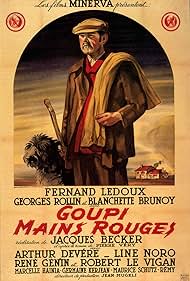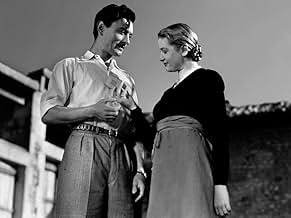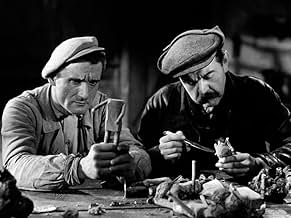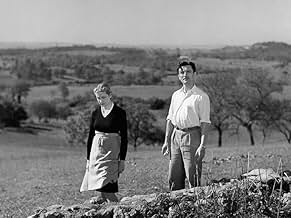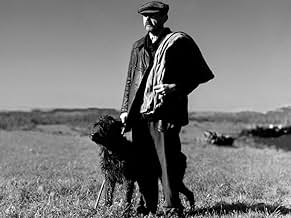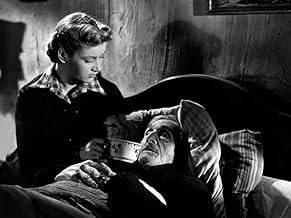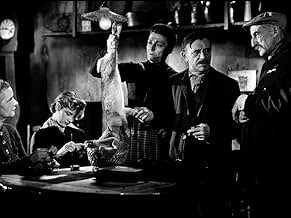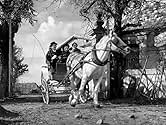IMDb RATING
7.5/10
1.1K
YOUR RATING
In a lost French village, an old woman is killed and her savings stolen. Several members of her family, all called "Goupi", are suspected.In a lost French village, an old woman is killed and her savings stolen. Several members of her family, all called "Goupi", are suspected.In a lost French village, an old woman is killed and her savings stolen. Several members of her family, all called "Goupi", are suspected.
- Director
- Writers
- Stars
- Awards
- 1 win total
Albert Rémy
- Jean des Goupi
- (as Rémy)
Georges-François Frontec
- Bit Part
- (uncredited)
Maurice Marceau
- Un porteur à la gare
- (uncredited)
- Director
- Writers
- All cast & crew
- Production, box office & more at IMDbPro
Featured reviews
French cinema from the era of the Occupation not surprisingly continues to remain relatively unfamiliar territory, along with French rural life in general. In 1943, however, two major postwar directing talents, Jacques Becker & Henri-Georges Clouzot attracted attention with their second feature films, both rural melodramas as far from Marcel Pagnol as you could get: Becker's 'Goupi Mains Rouge' and Clouzot's 'Le Corbeau'.
Although the opening strongly reminded me of Will Hay arriving at Buggleskelly in 'Oh, Mr. Porter!', what follows is neither as funny, as dramatic - considering that someone gets murdered - or as rural as I had been expecting; with much of the action consisting of talk in the hotel occupied by the grotesque Goupi clan, presided over by the extremely elderly Emperor (played by Maurice Schutz).
As one expects from a Becker film, the acting is consistently good, including the veteran stage actor Fernand Ledoux in the title role, Robert Le Vigan (who ended his days in Argentina after fleeing the fall of Vichy France) as the craziest of the clan, and a young Albert Rémy, best remembered as Antoine Doinel's father in 'Les Quatre Cents Coups'.
I found most of this interesting but strangely uninvolving, and suspect it probably resonates more with a French audience.
Although the opening strongly reminded me of Will Hay arriving at Buggleskelly in 'Oh, Mr. Porter!', what follows is neither as funny, as dramatic - considering that someone gets murdered - or as rural as I had been expecting; with much of the action consisting of talk in the hotel occupied by the grotesque Goupi clan, presided over by the extremely elderly Emperor (played by Maurice Schutz).
As one expects from a Becker film, the acting is consistently good, including the veteran stage actor Fernand Ledoux in the title role, Robert Le Vigan (who ended his days in Argentina after fleeing the fall of Vichy France) as the craziest of the clan, and a young Albert Rémy, best remembered as Antoine Doinel's father in 'Les Quatre Cents Coups'.
I found most of this interesting but strangely uninvolving, and suspect it probably resonates more with a French audience.
For better or worse Jacques Becker is destined to be remembered - at least outside France - for Casque d'Or and whilst this is not bad as memorials go it's a pity that some of his other work such as Touchez pas au grisbi and this one are not better known and/or perhaps do not travel quite so well. Marcel Pagnol has a lot to answer for but not all of it is bad. He wrote the Book as far as French Provincials are concerned and if imitation really is the sincerest form of flattery then he will be a happy bunny and smiling down benignly on the likes of Les Enfants du Marais, etc. Of course in 1943 he could have looked Becker in the eye and laid a broad smile on him for he was still very much with us and it is interesting to speculate on what he would have made of this entry in which, in no particular order, Lust, Avarice and Murder, shuffle to center stage, take a bow and exit pursued by a cliche. Becker returned to the group-as-microcosm plot time and again and often - Touchez pas au grisbi, Casque d'Or, Le Trou - the group was the Underworld, but here it is our old friend the 'extended' family. Deep in Charente - though it could be anywhere where trees outnumber people -live the Clan Goupi, each one complete with his or her nickname and like families everywhere they have their own internicine digs. But what's a group situation without a catalyst so enter Eugene Goupi, fresh from Paris - his mother had fled the claustrophobic atmosphere when he was a mere tot so he has never seen his 'family - and enter Murder most foul and missing treasure and green-eyed monsters all contributing to a rich bouillabaise that stirs rather than shakes the viewer. Some sixty years later the actors, to a man, are virtually forgotten but they live on in this bizarrely-patterned yet ultimately warm patchwork quilt. 8/10
27-year-old Georges Rollin get called back from Paris by his father to their farm/inn, none of which he has seen for 25 years. He doesn't know why, but it turns out his father wants to consolidate the fortune of both branches of the family by marrying him to his cousin Blanchette Brunoy, despite the fact she and another cousin, Robert Vignon are getting it on. On arrival, he's scared out of his wits by an uncle, discovers his great-grandfather's corpse, is accused of murdering an aunt and stealing the mysterious family fortune.
A typical French country family, you'd say, particularly if you're fond of TOBACCO ROAD. Every one of them has a nickname that everyone in the town knows about to exclusion of actually knowing their real names: Goupi Monsieur or Goupi Le Loi or Goupi Mains Gauches and they don't get along particularly well, but unite against outsiders. As the movie went along, it got darker and darker, and I thought director Jacques Becker had made a Clouzot-style picture. Was he trying to get himself banned, too?
Well, you'll have to see how it turns out. It's certainly entertaining, and familiar enough if you come from a large family.
A typical French country family, you'd say, particularly if you're fond of TOBACCO ROAD. Every one of them has a nickname that everyone in the town knows about to exclusion of actually knowing their real names: Goupi Monsieur or Goupi Le Loi or Goupi Mains Gauches and they don't get along particularly well, but unite against outsiders. As the movie went along, it got darker and darker, and I thought director Jacques Becker had made a Clouzot-style picture. Was he trying to get himself banned, too?
Well, you'll have to see how it turns out. It's certainly entertaining, and familiar enough if you come from a large family.
An effective dark comedy and satire, that sort of reminded me of a warped, angry Gallic 'You Can't Take It with You'.
An outsider, in this case a son who left years ago, returns to his family, who are a strange and twisted lot indeed. Funny, but unlike the Capra film there is a tone of creepy decadence and potential violence underlying this group of only somewhat endearing eccentrics.
There are echoes too of Renoir (for whom Becker long served as an assistant) in it's pithy, insightful look at group and class dynamics. It flags at moments, and can't compete with Becker's later and greater films, but this a rarity worth seeking out.
An outsider, in this case a son who left years ago, returns to his family, who are a strange and twisted lot indeed. Funny, but unlike the Capra film there is a tone of creepy decadence and potential violence underlying this group of only somewhat endearing eccentrics.
There are echoes too of Renoir (for whom Becker long served as an assistant) in it's pithy, insightful look at group and class dynamics. It flags at moments, and can't compete with Becker's later and greater films, but this a rarity worth seeking out.
Who could have wanted to kill Tisane? The list of suspects is a long one. Marie and her son Jean had just been told that they would have to leave the house where they had been taken in "out of charity"; no love lost there. Mains-Rouges and Tonkin both had been the targets of Tisane's insults over the years, while Muguet had just been told that she must marry Monsieur, who has just arrived from Paris. The 10,000 francs that Tisane had hidden in the armoire are missing... The story as told by Pierre Véry and Jacques Becker is full of atmosphere and menace and has the cream of French actors of the time (those who hadn't left Vichy France for easier surroundings).
Fernand Ledoux is splendid as Mains-Rouges; he puts on a deadpan face in order to play detective--we are told that the Goupis have no need of the police, they solve all their problems in house. Robert Le Vigan is once more at the top of his game: Tonkin is so poetic and threatening, an unforgettable performance. Blanchette Brunoy gives an accomplished performance as Muguet, the girl who is not sure where her heart lies.
A film classic that is not available on DVD is an orphan. Will somebody give this deserving orphan a home?
Fernand Ledoux is splendid as Mains-Rouges; he puts on a deadpan face in order to play detective--we are told that the Goupis have no need of the police, they solve all their problems in house. Robert Le Vigan is once more at the top of his game: Tonkin is so poetic and threatening, an unforgettable performance. Blanchette Brunoy gives an accomplished performance as Muguet, the girl who is not sure where her heart lies.
A film classic that is not available on DVD is an orphan. Will somebody give this deserving orphan a home?
Did you know
- TriviaAward: Grand Prix du Cinéma Français 1943.
- ConnectionsFeatured in My Journey Through French Cinema (2016)
- How long is It Happened at the Inn?Powered by Alexa
Details
- Release date
- Country of origin
- Language
- Also known as
- Dogodilo se u krčmi
- Filming locations
- Charente, France(Exterior)
- Production company
- See more company credits at IMDbPro
- Runtime
- 1h 36m(96 min)
- Color
- Aspect ratio
- 1.37 : 1
Contribute to this page
Suggest an edit or add missing content
